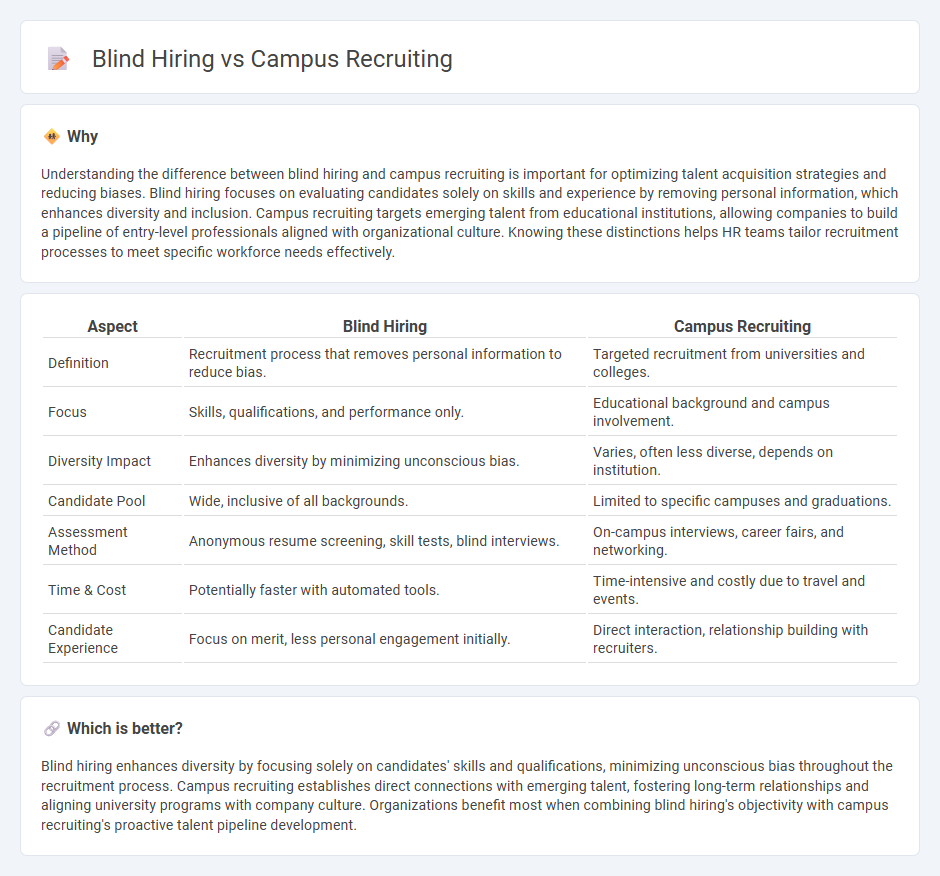
Blind hiring eliminates bias by focusing solely on candidates' skills and qualifications, enhancing diversity and inclusion in talent acquisition. Campus recruiting targets recent graduates, building a pipeline of fresh talent and promoting employer branding on university campuses. Explore how these strategies can transform your recruitment process and improve workforce quality.
Why it is important
Understanding the difference between blind hiring and campus recruiting is important for optimizing talent acquisition strategies and reducing biases. Blind hiring focuses on evaluating candidates solely on skills and experience by removing personal information, which enhances diversity and inclusion. Campus recruiting targets emerging talent from educational institutions, allowing companies to build a pipeline of entry-level professionals aligned with organizational culture. Knowing these distinctions helps HR teams tailor recruitment processes to meet specific workforce needs effectively.
Comparison Table
| Aspect | Blind Hiring | Campus Recruiting |
|---|---|---|
| Definition | Recruitment process that removes personal information to reduce bias. | Targeted recruitment from universities and colleges. |
| Focus | Skills, qualifications, and performance only. | Educational background and campus involvement. |
| Diversity Impact | Enhances diversity by minimizing unconscious bias. | Varies, often less diverse, depends on institution. |
| Candidate Pool | Wide, inclusive of all backgrounds. | Limited to specific campuses and graduations. |
| Assessment Method | Anonymous resume screening, skill tests, blind interviews. | On-campus interviews, career fairs, and networking. |
| Time & Cost | Potentially faster with automated tools. | Time-intensive and costly due to travel and events. |
| Candidate Experience | Focus on merit, less personal engagement initially. | Direct interaction, relationship building with recruiters. |
Which is better?
Blind hiring enhances diversity by focusing solely on candidates' skills and qualifications, minimizing unconscious bias throughout the recruitment process. Campus recruiting establishes direct connections with emerging talent, fostering long-term relationships and aligning university programs with company culture. Organizations benefit most when combining blind hiring's objectivity with campus recruiting's proactive talent pipeline development.
Connection
Blind hiring reduces unconscious bias by focusing on candidates' skills and qualifications, making it especially effective in campus recruiting where diverse talent pools are abundant. By anonymizing applications, companies can evaluate students from various universities solely on merit, enhancing diversity and inclusivity. Integrating blind hiring practices into campus recruitment strategies supports equitable talent acquisition and fosters a more inclusive workplace culture.
Key Terms
**Campus Recruiting:**
Campus recruiting targets recent graduates by engaging directly with universities to source talent, enhancing employer branding and reducing time-to-hire. This method leverages structured internship programs, campus events, and career fairs to identify candidates who fit the company culture and role requirements. Discover how campus recruiting can transform your talent acquisition strategy.
University Partnerships
University partnerships play a crucial role in campus recruiting by providing direct access to diverse student talent pools, enabling tailored recruitment strategies aligned with academic programs. Blind hiring, often integrated into these partnerships, minimizes biases by focusing on candidates' skills and potential rather than demographic details, fostering equitable opportunities. Explore how combining campus recruiting with blind hiring through university collaborations can enhance talent acquisition and diversity.
Internship Programs
Campus recruiting targets students from specific universities, enabling companies to tap into a pool of candidates already vetted through academic performance and extracurricular involvement, which is especially beneficial for structured internship programs. Blind hiring removes identifiers such as names and educational institutions from applications, focusing solely on skills and qualifications, thereby enhancing diversity and reducing unconscious bias in internship selections. Explore more about how each method can optimize your internship program's success and inclusivity.
Source and External Links
Everything You Need to Know About Campus Recruitment - Yello - Campus recruitment is a year-round strategy for sourcing and hiring young talent for internships and entry-level roles, requiring tailored engagement for different student generations and ongoing communication with potential candidates.
Campus Recruitment - Career Center - Boston College - Employers visit campuses for information sessions, coffee chats, and interviews to recruit students of all majors and class years for full-time jobs and internships, often posting opportunities and events through platforms like Handshake.
Recruiting & Campus Interviews - Mignone Center for Career Success - Over 100 employers participate in on-campus recruiting at Harvard, offering career fairs, information sessions, and interviews for internships and full-time roles, with application deadlines and interview scheduling managed through the university's career platform.
 dowidth.com
dowidth.com